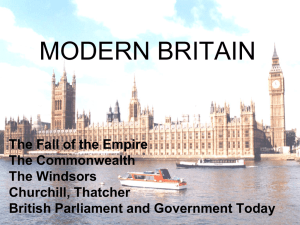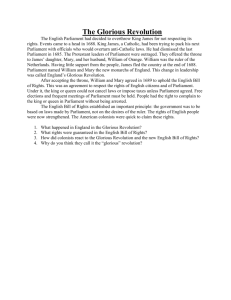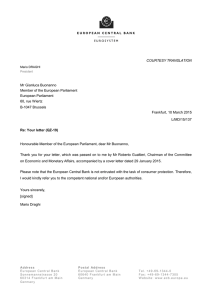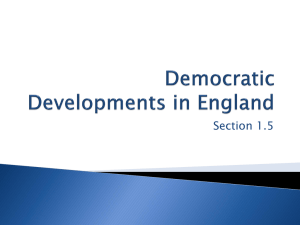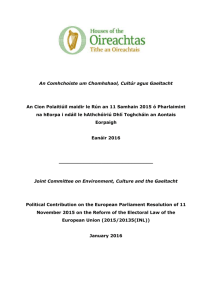comparative politcs essay 2
advertisement
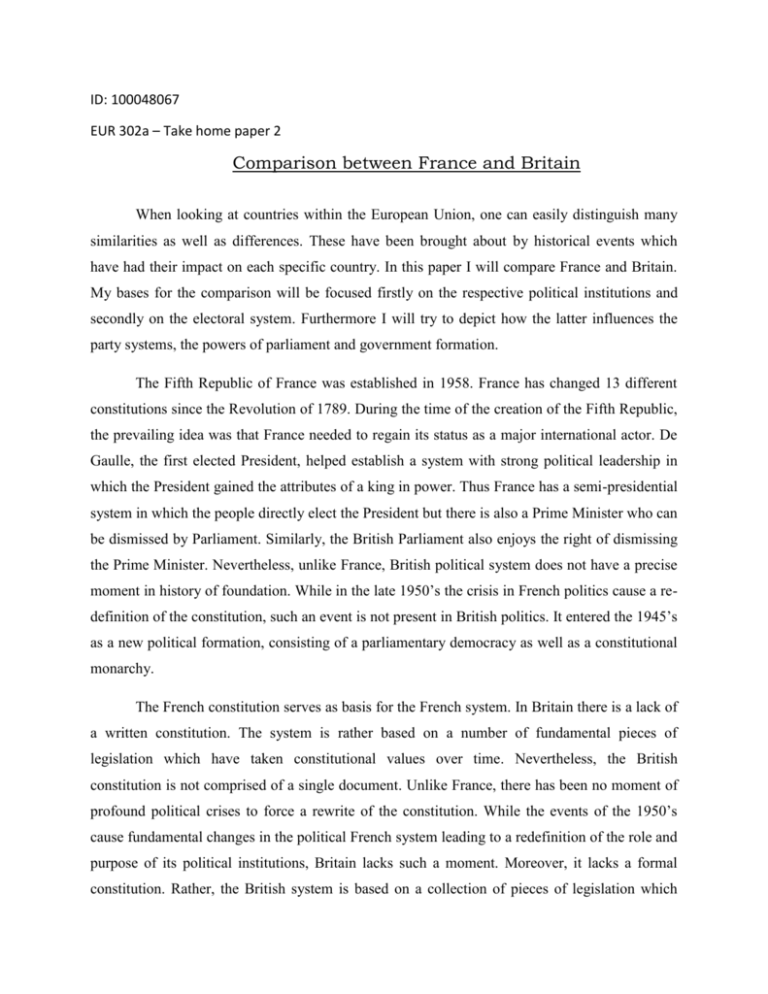
ID: 100048067 EUR 302a – Take home paper 2 Comparison between France and Britain When looking at countries within the European Union, one can easily distinguish many similarities as well as differences. These have been brought about by historical events which have had their impact on each specific country. In this paper I will compare France and Britain. My bases for the comparison will be focused firstly on the respective political institutions and secondly on the electoral system. Furthermore I will try to depict how the latter influences the party systems, the powers of parliament and government formation. The Fifth Republic of France was established in 1958. France has changed 13 different constitutions since the Revolution of 1789. During the time of the creation of the Fifth Republic, the prevailing idea was that France needed to regain its status as a major international actor. De Gaulle, the first elected President, helped establish a system with strong political leadership in which the President gained the attributes of a king in power. Thus France has a semi-presidential system in which the people directly elect the President but there is also a Prime Minister who can be dismissed by Parliament. Similarly, the British Parliament also enjoys the right of dismissing the Prime Minister. Nevertheless, unlike France, British political system does not have a precise moment in history of foundation. While in the late 1950’s the crisis in French politics cause a redefinition of the constitution, such an event is not present in British politics. It entered the 1945’s as a new political formation, consisting of a parliamentary democracy as well as a constitutional monarchy. The French constitution serves as basis for the French system. In Britain there is a lack of a written constitution. The system is rather based on a number of fundamental pieces of legislation which have taken constitutional values over time. Nevertheless, the British constitution is not comprised of a single document. Unlike France, there has been no moment of profound political crises to force a rewrite of the constitution. While the events of the 1950’s cause fundamental changes in the political French system leading to a redefinition of the role and purpose of its political institutions, Britain lacks such a moment. Moreover, it lacks a formal constitution. Rather, the British system is based on a collection of pieces of legislation which have taken constitutional value over time. One example is the Bill of Rights which has taken such a value in the British system. The British system is based on the Westminster Model with London at the center of its politics. The reference point of the British traditional “Westminster” model is ‘parliamentary sovereignty’. In the France however, the political system create the expectation of presidential leadership. While Britain’s Westminster model in build on a few defining features such as the absolute power of the Parliament, while still maintaining a monarch. France’s system is one of semi-presidentialism. While the first represent a model of a unitary state build upon the presupposition of absolute parliamentary sovereignty, the latter produces two main political actors. In the French system, the people directly elect the president but there is also a Prime minister. The similarity between the French and the British system is that in both cases, the Parliament has the power to dismiss the Prime Minister. One can conclude that the French Council of Ministers is equivalent to the British Cabinet. The semi-presidentialism of the French produces a head of State (the president) as well as a head of government (the prime minister). While most of the time both actors come from the same political families there can be cases to the contrary which can result to be problematic and decrease the power of the president. Such cases as referred to as co habitation. The president has greater responsibility for high matters of the state while the Prime minister would appear to be responsible for matters related to domestic policy. Contrary to the French system, there is no clear separation of powers between the legislative and the executive branches in the British system. Besides the differences in the political system, France and Britain differ in terms of parliamentary powers. This is as a result of the electoral system. Thus, the British people express their will of representation only when the Parliament is dissolved. After this occurs, the majority in Parliament forms a government in the form of a Cabinet that makes the necessary policies in accordance to the civil service. Although new parties might move into power, the civil service which is subordinate to the executive does not change. Since the executive is also subordinate to Parliament, one can conclude that the Parliament has absolute authority within the British system, Hence, the term ‘parliamentary sovereignty’. Contrary to Britain, the French parliament is rather weak. It has a restricted field of action as well as weak budgetary power. The Parliament can be circumvented by a referendum. Article 49.3 further weakens its powers. This clause in the article gives the government the right to adopt a piece of legislation without going through voting. According to Article 49.3, the French parliament can not oppose without overthrowing the government. In this case there would be a need of new elections. Furthermore, “The Nuclear Weapon” is the right of the President to dismiss the National Assembly (lower house of Parliament) and call for new elections. The President has the power to dismiss right away the representatives who have been chosen by the people. Thus, the Parliament has a very weak role in French politics. In the British system, no one can annul a piece of legislation because it has been approved by parliament and the parliament is sovereign. However, it is only binding as long as the current Parliament serves. The Cabinet Government is monitored by the Parliament. The electoral system has an impact not only on Parliament power as mentioned above, but also on political parties and government formation. On the one hand, France has a two-block multi party system based on political competition between the left and the right. On the other hand, Britain posses a two-party system. The electoral rules determine the structure, organization and strategies of political parties. Thus, in France, the electoral system of a two ballot majority- plurality encourages multi – party competition. This counterbalances alliance- building logic. Conversely, the first –past – the- poll electoral system of Britain supports the creation of a two- party- system., mainly between the Labour Party and The Conservative Party. Likewise the effects of the differing electoral systems are reflected in the government creation. While in France, the system creates a strong majoritarian logic as well as coalitions, the situation is not the same in Britain. The government is led by party majority of seats with a discrepancy between the number of votes and the number of seats. Through a comparison between two different countries within the European Union, one can conclude that the political institutions as well as the electoral system cause diverse systematic outcomes. This illustrates the dynamics in Europe as a whole and helps us understand how these distinctive countries function individually and as a whole.


